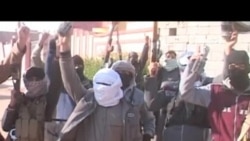WASHINGTON —
Violence continues to escalate in Iraq since al-Qaida-linked militants seized neighborhoods in the cities of Fallujah and Ramadi in Anbar province. Top Iraqi officials are hoping the country’s military will not be forced to storm the city and risk large-scale civilian casualties.
Since early January radical Islamic militants have seized territory in restive Anbar province.
They are members of the Islamic State of Iraq and Syria [ISIS] - the most hardline jihadists battling in the region.
Middle East analyst James Phillips said, “It is clear that Fallujah today is the epicenter of a struggle for the future not only of Iraq, but of the broader region, particularly what’s going on in Syria.”
The Baghdad government has been striking back, but mostly on the outskirts of the cities.
The United States is supplying air-to-ground missiles and drones to help with the fight.
Iraqi Prime Minister Nouri al-Maliki said, "The important thing is not to attack the city and kill innocent people because of those criminals. Time is not important. The important thing is to preserve the blood of Fallujah’s people."
The prime minister is trying to reassert control over Anbar by convincing Sunni tribesmen, who have felt neglected by the Shi’ite-led government, to oust the militants.
The central government has approved millions of dollars in payments to the tribes and is arming tribal fighters and local authorities.
Lukman Faily, the Iraqi Ambassador to the U.S., said, “The long-term approach is to have a long view of our relationship with the tribes, with the local authorities, and to make sure that the local police are able to counter that rather than for the military armed to go inside the cities.”
After years of fierce fighting in Iraq, U.S. troops defeated al-Qaida in Anbar by recruiting and arming local tribesmen to fight the militants.
Marines who fought there are frustrated now that jihadists have stormed back into the province for the first time since U.S. troops left Iraq.
Retired General James Conway, the former Commandant of the Marine Corps., said, “If you have a young Marine or soldier sitting with his legs missing, he could at least previously say 'well what we did was the right thing, Iraq is better for it and we won.' I am not sure that same individual sitting in that chair is thinking those things these days, and that is truly sad.”
Iraqi army units are deployed in Anbar, but remain outside the cities.
Parliamentary elections are scheduled for April.
By then, officials say, the province will have to be a safe place for Iraqis to vote.
Since early January radical Islamic militants have seized territory in restive Anbar province.
They are members of the Islamic State of Iraq and Syria [ISIS] - the most hardline jihadists battling in the region.
Middle East analyst James Phillips said, “It is clear that Fallujah today is the epicenter of a struggle for the future not only of Iraq, but of the broader region, particularly what’s going on in Syria.”
The Baghdad government has been striking back, but mostly on the outskirts of the cities.
The United States is supplying air-to-ground missiles and drones to help with the fight.
Iraqi Prime Minister Nouri al-Maliki said, "The important thing is not to attack the city and kill innocent people because of those criminals. Time is not important. The important thing is to preserve the blood of Fallujah’s people."
The prime minister is trying to reassert control over Anbar by convincing Sunni tribesmen, who have felt neglected by the Shi’ite-led government, to oust the militants.
The central government has approved millions of dollars in payments to the tribes and is arming tribal fighters and local authorities.
Lukman Faily, the Iraqi Ambassador to the U.S., said, “The long-term approach is to have a long view of our relationship with the tribes, with the local authorities, and to make sure that the local police are able to counter that rather than for the military armed to go inside the cities.”
After years of fierce fighting in Iraq, U.S. troops defeated al-Qaida in Anbar by recruiting and arming local tribesmen to fight the militants.
Marines who fought there are frustrated now that jihadists have stormed back into the province for the first time since U.S. troops left Iraq.
Retired General James Conway, the former Commandant of the Marine Corps., said, “If you have a young Marine or soldier sitting with his legs missing, he could at least previously say 'well what we did was the right thing, Iraq is better for it and we won.' I am not sure that same individual sitting in that chair is thinking those things these days, and that is truly sad.”
Iraqi army units are deployed in Anbar, but remain outside the cities.
Parliamentary elections are scheduled for April.
By then, officials say, the province will have to be a safe place for Iraqis to vote.





